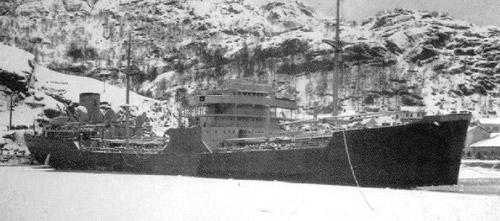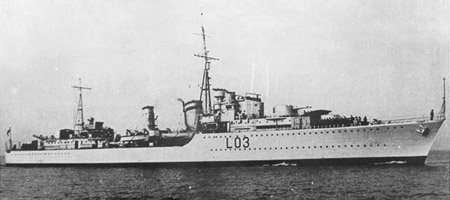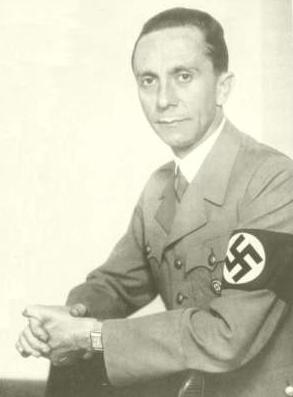This Neutrality is a Queer Business
The War Illustrated, Volume 2, No. 27, Page 202, March 8, 1940.
The "Altmark" incident (fully described in pages 171-173) set a pretty problem in international law. So direct was the conflict of opinion between Britain and Norway that the latter suggested that the affair should be referred to arbitration. The principal points at issue are set out below, together with some other pertinent factors.
When the men from the "Cossack" shouted down the hatchways of the Nazi slave-ship the words "The Navy is here", they did not realize – they would not have cared very much perhaps if they had – that their action in liberating their comrades from durance vile would give rise to a tremendous, world-wide argument.
When the released prisoners were being brought home across the North Sea a terrific hullabaloo broke out. Germany's rage was to be expected, for the Nazi stage-managers had already made their plans for celebrating a triumph in which the 300 captives would be featured. But the furore extended through the whole neutral world, and in particular to Norway, whose Foreign Office protested against what is described as "a gross violation of Norwegian territorial waters".
According to the British view, if the "Altmark" was a merchantship, then she should have been inspected by Norwegian authorities, and, on the presence of the prisoners being discovered, they should have been at one released and interned. If, on the other hand, she was a warship – and, in fact, there was no doubt of her naval status – then the 24-hour rule should been applied.
This rule derives from Article 12 of the Hague Convention No. XIII of 1907, which reads: "In the absence of special provisions to the contrary in the legislation of a neutral Power, belligerent warships are not permitted to remain in ports, roadsteads, or territorial waters of the said Power for more than 24 hours." But in 1938 fresh neutrality regulations had been drawn up by Norway (in common with other Scandinavian countries), regulating the admission of the warships of belligerent powers to Norwegian ports and territorial waters. Commenting on these regulations at the time, the British Government had stated that "they have always maintained and must continue to maintain the existence of such a right of entry for the purposes of innocent passage".
The crux of the matter would seem to lie in the phrase "innocent passage". Whatever the British Government meant, and whatever the Norwegians thought they meant, we may be sure that it was never intended that a belligerent warship should be entitled to sail day after day through territorial waters, immune from attack and dodging in and out on its business of making war.
 Here is the "Altmark" as she lay ashore in Joessing Fjord surrounded by ice and with the steep rocky hills covered with snow as a background. It can be seen that the "Admiral Graf Spee's" satellite ship resembled in very respect an ordinary tanker, one of the most familiar types of merchant-ships that sail the seas, so that the difficulty of spotting her was very great. Photo, Keystone.
Here is the "Altmark" as she lay ashore in Joessing Fjord surrounded by ice and with the steep rocky hills covered with snow as a background. It can be seen that the "Admiral Graf Spee's" satellite ship resembled in very respect an ordinary tanker, one of the most familiar types of merchant-ships that sail the seas, so that the difficulty of spotting her was very great. Photo, Keystone.
Norway's indignation was understandable, the more so as it must have seemed as if she had been wounded in the house of her friends. Before long it was recognized, however, that if a wrong had been committed, it was to right a greater wrong. Then the publication, when the controversy was at its height, of the losses suffered by the Scandinavian countries through German submarines and mines served to recall public attention to a danger far more real and pressing than an alleged infringement of a Hague article. Since the beginning of the war Norway has lost through Nazi action 49 ships totalling 168,527 tons, with the death of 327 sailors; while in the same period Denmark has lost 19 ships of a total of 73,000 tons and 225 sailors, and Sweden 32 ships (65,000 tons) and 243 seamen killed or missing.
Yet the Nazis had the effrontery once again to lecture the neutrals on how they should act in wartime. Dr. Goebbels told a meeting of neutral journalists that true neutrality meant agreement with the German point of view.
While Norway murmured and Germany raved and reviled, the rest of the world looked on in half-envious admiration. An Italian spokesman said that he would like to think that any other navy would have done the same, and the Americans pointed out that when in 1916 the "Appam", a British liner captured by the Germans, put in at an American port with a cargo of British prisoners, she was at once compelled to release them. As for the French, their public opinion was summed up in a sentence in a "L'Intransigeant" leader: "The British were quite right; neutrality cannot be one-way."
Previous and next article from The Battle of the River Plate
The Nazi Slave-Ship Feels the Nelson Touch
Yet another dramatic chapter in the history of the British Navy was written when on February 16 H.M.S. "Cossack" pursued the Nazi slave-ship "Altmark" into a Norwegian fjord and rescued 299 British pr
Index
Previous article
The Nazi Slave-Ship Feels the Nelson Touch
Yet another dramatic chapter in the history of the British Navy was written when on February 16 H.M.S. "Cossack" pursued the Nazi slave-ship "Altmark" into a Norwegian fjord and rescued 299 British pr
Next article
The Mystery of Murmansk
Something is happening at Murmansk, but what is difficult to perceive through the fog of rumour. Below we give a review of possible moves in that quarter, accompanied by an account of the Murmansk Exp






